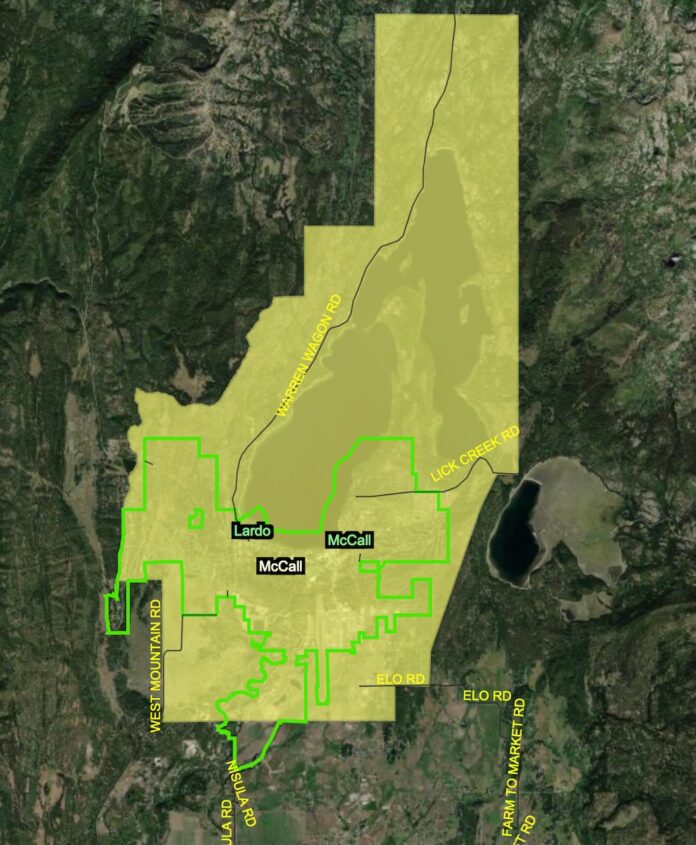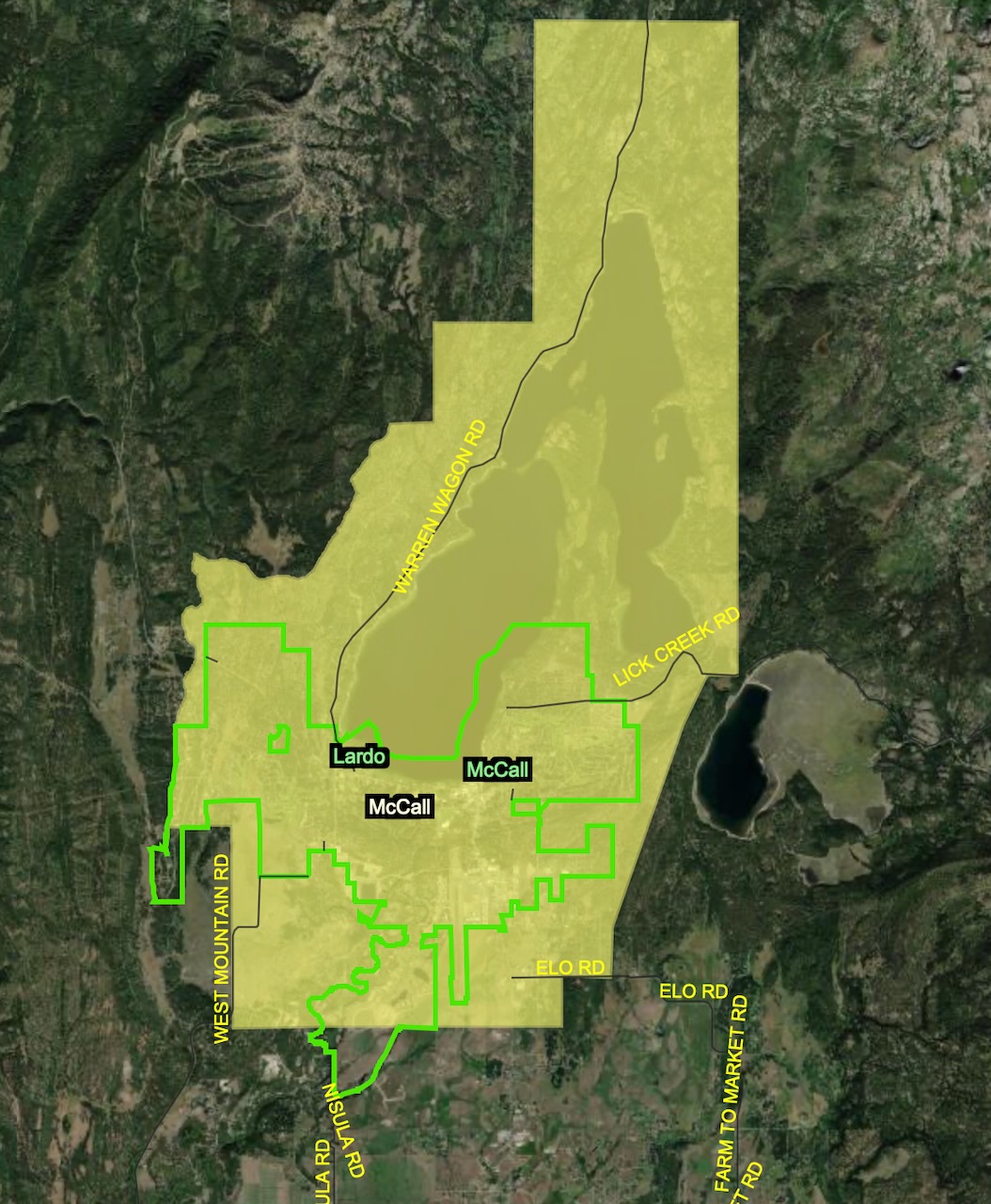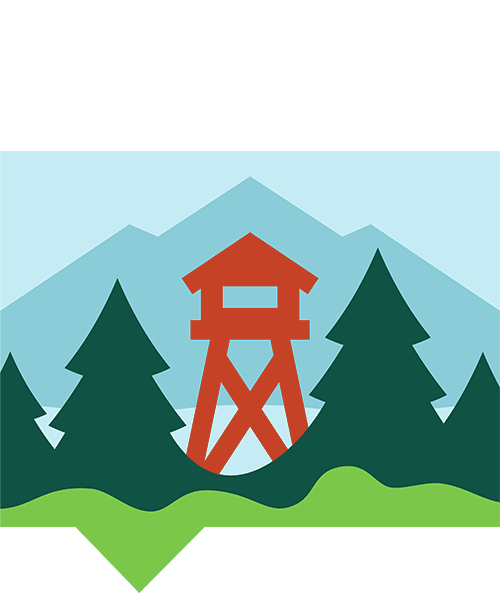Elected officials from the City of McCall and Valley County will convene on Monday afternoon to discuss the future of a planning boundary that influences growth surrounding McCall.
The meeting, which will be held from 3 p.m. to 5 p.m. in the Community Room of the McCall Public Library, will mark the second between the agencies to discuss the McCall Impact Area.
The meeting does not include a public hearing, but written public comments can be submitted in advance here.
What is the McCall Impact Area?
The impact area is about 17,000 acres, or more than 26 square miles, of county land surrounding McCall city limits that is managed under zoning laws that closely resemble those in place within the city.
The impact area’s boundaries currently surround Payette Lake and extend south to Elo Road, west to Adams County, and east toward Little Payette Lake.
A new state law, however, requires the city and county to review the current boundaries and either confirm or set new boundaries by the end of this year. The county has final say on the decision.
County officials have suggested that the law’s updated criteria for determining the boundaries will force the size of the impact area to be reduced.
How does the impact area work?
Currently, development applications in the impact area are reviewed by the McCall Area Planning and Zoning Commission, which includes four McCall residents appointed by the city and three impact area representatives appointed by the county.
Land within the impact area is subject to specific zoning designations that guide the types of developments that can be proposed. Low-density residential zoning currently applies to most of the impact area.
Commercial uses are allowed under the residential zoning, but only after the P&Z issues a permit finding that the use is compatible with neighboring properties.
What could change?
If the impact area is removed, it is likely that the lands within would become subject to Valley County’s multiple-use zoning concept, which does not assign specific zones to parcels.
Instead, all development applications are scored using a nine-point test to determine the compatibility of new proposals with existing uses on neighboring properties.
Without donors like you, this story would not exist.
Make a donation of any size here
Those evaluations would be completed by the Valley County Planning and Zoning Commission for any areas in which the impact area designation is removed.
What is the new state law?
Until last year, impact areas were allowed to include land that “can reasonably be expected to be annexed to the city in the future.” The Idaho Legislature, however, updated that expectation to “within five years” and added new criteria for determining impact areas.
The new criteria for determining the boundaries include geographic features, expected growth, other public service district boundaries, and transportation infrastructure.
The law also requires central water and sewer service to be available within impact area boundaries within five years. County officials have doubted that condition can be met with the current impact area boundaries.
Impact areas also may no longer extend further than two miles outside of city limits. In McCall, the impact area’s northern boundary beyond Payette Lake is nearly six miles from city limits.
All cities and counties must update the boundaries of existing impact areas to comply with the updated standards by the end of this year, under the law.
City: impact area provides ‘consistency’
McCall staff and members of the McCall City Council have emphasized the importance of the impact area since an initial meeting last September to discuss the boundaries with the county commissioners.
Governing county land surrounding McCall with city zoning and standards provides “consistency” and “long-term sustainability,” according to a February letter sent to impact area residents.
“Changes in neighborhood character” and “expansion of industrial and commercial development patterns” are among the potential impacts listed in the letter.
Compatibility quarrels
Over the last year, the city and county, which retains final say on impact area land use decisions, have been at odds over what is and is not compatible with existing homes.
In January, the county commissioners approved an expansion of Stor-It Self Storage at 379 Elo Rd. despite multiple recommendations from the McCall P&Z to deny the application amid concerns about its compatibility with nearby homes.
A similar scenario played out last summer when the county approved the 37-unit Alpine Storage Condos at 450 South Samson Trail after the P&Z recommended denial of the application—again amid concerns about compatibility with nearby homes.






